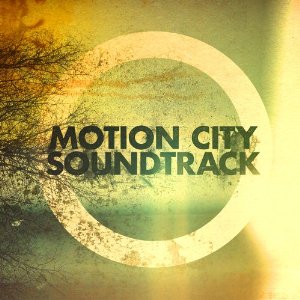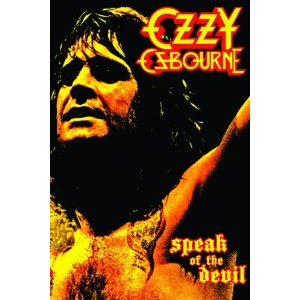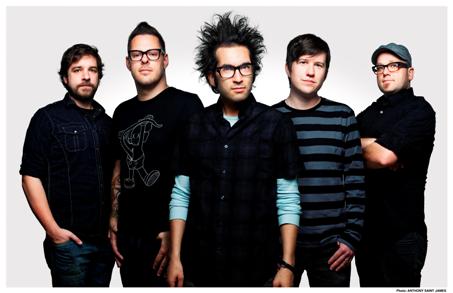Minneapolis' Motion City Soundtrack has a new album, Go, featuring their song "Son Of A Gun," which is being presented here exclusively along with an associated webisode with bandmates discussing its awesomeness.
Exclusive Webisode:

Exclusive: Motion City Soundtrack "Son Of A Gun"

A Conversation With Rudy Sarzo
Mike Ragogna: Rudy, how've you been?
Rudy Sarzo: I've been outstanding. How've you been, Mike?
MR: Not too shabby. Speak of the Devil -- your newly released DVD with Ozzy Osbourne -- has to evoke some really great memories.
RS: Yeah, I've been watching it. This is an official release of a video that we actually did 30 years ago. Everybody in the band -- Ozzy, Tommy Aldridge, Randy Rhoads, Don Airey, and myself -- we were really excited about making this video to document our Diary Of A Madman show for that tour, so we were all looking forward to making this. As most people are aware, Randy Rhoads passed away March 19, 1982, just a few months before we actually got to video the concert. Continuing for many reasons -- one of them mostly being keeping Ozzy occupied, because after the crash, he was in an extremely fragile mental and spiritual state -- it was decided to keep moving, keep him occupied, so that's one of the main reasons we continued the tour. In the process, Brad Gillis became our guitar player, so when you actually watch the show, it was the final show of the North American leg of the tour at Irvine Meadows with Brad Gillis in the role of Ozzy's guitar player...
MR: Watching this DVD, it's obvious that it's not just a document of the period, it's almost like you guys are bearing your soul.
RS: You hit the nail right on the head. When you watch this, you're not watching a regular show, a regular performance. This is... the best way I can describe it from being there and having to emotionally go into a certain place to have to perform, it's a celebration for Ozzy and a once in a lifetime physical collaboration with Randy Rhoads. Most of the music, except for 2-1/2 songs of the whole set, are music and songs taken from the Blizzard Of Oz and the Diary Of A Madman tour. It was the last tour that there was so much emphasis for Ozzy. After that, he put more emphasis on Speak Of The Devil, which was a re-recording of the Black Sabbath classics. Later on that year, he was promoting Bark At The Moon and so on. This tour on the DVD is the bulk of it from those two albums. It's also a celebration of the friendship we all shared with Randy. It's a triumph of the human spirit. To be able to continue with that tour, our mission, our purpose was to celebrate Randy Rhodes and that is what you are witnessing when you watch that DVD.
MR: What were the dynamics of the band, friendship-wise and musically?
RS: It all went hand in hand. You could not separate one from the other. I was blessed to play with Randy in Quiet Riot and Ozzy Osbourne, so I actually saw the metamorphosis of a young, local, guitar hero in Los Angeles in the music scene -- as we were playing in Hollywood -- eventually becoming the rock legend he became. From being able to bear his soul through his music... that's the license Ozzy gave Randy. He did not have that license as long as he was a local guitar player for Quiet Riot because we were at the mercy of the record industry. The record industry was dictating what they wanted to hear from bands like Riot -- we were playing the record company's game. As soon as Randy became a member of Ozzy Osbourne, Ozzy gave him the freedom to be himself. Randy asked him, "What do you want me to do, what do you want me to be?" Ozzy said, "Just be yourself," and that's where all of that music came from -- total creative freedom.
MR: I know you and Randy were very close, proof of that being in your book Off The Rails. Sure, it's about the band, but there's so much centered around Randy, you get the impression he was the centerpiece of the group.
RS: In so many ways, he was. He inspired everybody, he really did. If I had issues going on with the dynamics of the personalities, I'd call Randy and he'd put everything in perspective for me. I learned so much musically from him and also the human side of him. There are people I have played with who are no longer with us and I ask myself what would Randy do in this case, and I usually get the right answer.
MR: Then you'd moved on to Quiet Riot.
RS: I received a phone call after Randy passed away from Kevin DuBrow and he asked me if I would go in and record one song as a tribute to Randy Rhoads. The song was "Thunderbird," a song we knew. It was a song that Kevin and I performed together while I was in Kevin's band, DuBrow, just before he became Quiet Riot again. I would occasionally perform with Kevin at the time, so I was very familiar with the song. It was a song he wrote when Randy left Quiet Riot to join Ozzy, so it wasn't written after he passed away but it was recorded after he passed away. So as a tribute to Randy -- he was still a member of Ozzy at the time -- he did one particular song. Then when I went to the studio, Kevin asked me if I still remembered any of the other songs that we played in Quiet Riot or DuBrow together, like "Slick Black Cadillac" and "Love The Bitch" and so on. By the time I left the session, I'd basically done half of the album. That's how the whole thing came about. It was emotionally very, very hard for everybody to go on stage without Randy, and the best way we could deal with it was to get in and dig into our souls and just connect and through the music was a way of connecting with Randy. Not only were these songs that he composed -- and he left a lot of himself in his music--but also, these were the songs that we were playing with him just a few days before. So this was our way of connecting with his spirit.
MR: In 1989, you appeared on the Slip Of The Tongue album with Whitesnake and David Coverdale.
RS: Actually, I joined the band in '87. We toured the '87 album together, then in '89, we entered production and started recording the album and it was released in '90.
MR: How long were you with Whitesnake totally?
RS: I joined in 1987. I think we started the tour in '90, it was released in '89, and I was a member until my last tour with Whitesnake was in '94.
MR: And there were other projects such as M.A.R.S.
RS: That actually happened right before Whitesnake. That was Tony MacAlpine, Tommy Aldridge, and a vocalist named Rob Rock
MR: And let's not forgot your time with Dio.
RS: Yes, from 2004 until Ronnie passed away. As a matter of fact, we had a service, a memorial for him a few days ago, May 16. We got together -- Glenn Hughes, Doug Aldrich, Simon Wright. We reflected near his resting place.
MR: What are your thoughts on Black Sabbath?
RS: I'm a huge fan of both eras -- the Ozzy Osbourne era and the Ronnie James Dio era. They're both so different and both so inspiring. Their music is so incredible.
MR: Rudy, what advice do you have for new artists?
RS: Learn persistence. It's a whole different world out there. Don't ever forget the reasons you're playing. Don't ever lose your burning desire to communicate, to tell your story.
MR: Some people speak through their mouths, some people speak through their guitars.
RS: It's a language. You can put words in print, but once they come out of your mouth, they're just invisible. So is music. It's all created by vibrations. Using the right words at the right time will have the same effect as playing the right notes at the right time.
MR: Rudy, anything on the horizon that we should know about?
RS: Oh yeah, I have band called Animetal USA and we have a second album coming out in June that we're going to be touring in Japan and in some states in America and all over the world. It's anime-centric, so anybody who is a fan of anime, this is the band for you.
MR: Wait, we can't let you get away without talking about your expertise in anime and animation. How did you first get interested in the field?
RS: Well, I'm an evangelist, basically... for the musician. Back in the day, we would leave our video content in the hands of professionals that were hired by record companies with major, huge budgets. It could be a half a million dollars... like my last video! As much as you are the creator of your music, now, the creation of your videos can be left in the hands of musicians today. The same technology to create your audio is also there for you to create your video. By getting content using a high definition camera, using editing software like Vegas or Premier or something like that -- and I do basically video effects and 3D animation -- it's up to your imagination. The tools are in your hands or available to be in your hands.
MR: You created that 3D animation video wall that was used to open the Dio concerts in Europe.
RS: Yes, I did. That was my first jump into it. I did a lot of learning quick. I am fortunate that I have a lot of friends in the industry. I call them up and they give me advice and help me out with it.
MR: And let's not forget, you did the Working Man's Bass, the loop library for Sony Pictures.
RS: Yes. As a matter of fact, that was the first bass loop library that Sony released. It's still selling and I can still hear it in a lot of music on television and in films.
MR: Have I missed anything?
RS: You're doing a fine job.
MR: (laughs) I appreciate it, Rudy. This is our second interview together, and I love talking with you. You're just as happy and just as cool as before, and I really appreciate your time when you do this.
RS: Thank you, sir, I really appreciate it, Mike. I appreciate that you're green, you're solar-powered. It's so sensible. I can't wait until we're able to harness more of that for our country.
MR: Nicely said. Rudy, a big thanks here. Let's talk real soon, sir.
RS: God bless.
MR: You created that 3D animation video wall that was used to open the Dio concerts in Europe.
RS: Yes, I did. That was my first jump into it. I did a lot of learning quick. I am fortunate that I have a lot of friends in the industry. I call them up and they give me advice and help me out with it.
MR: And let's not forget, you did the Working Man's Bass, the loop library for Sony Pictures.
RS: Yes. As a matter of fact, that was the first bass loop library that Sony released. It's still selling and I can still hear it in a lot of music on television and in films.
MR: Have I missed anything?
RS: You're doing a fine job.
MR: (laughs) I appreciate it, Rudy. This is our second interview together, and I love talking with you. You're just as happy and just as cool as before, and I really appreciate your time when you do this.
RS: Thank you Sir, I really appreciate it, Mike. I appreciate that you're green, you're solar-powered. It's so sensible. I can't wait until we're able to harness more of that for our country.
MR: Nicely said. Rudy, a big thanks here. Let's talk real soon, sir.
RS: God bless.
Tracks:
1) Over The Mountain
2) Mr Crowley
3) Crazy Train
4) Revelation (Mother Earth)
5) Steal Away (The Night)
6) Suicide Solution
7) Guitar / Drum Solo
8) Goodbye To Romance
9) I Don't Know
10) Believer
11) Flying High Again
12) Iron Man
13) Children Of The Grave
14) Paranoid
Transcribed by Brian O'Neal

